Anna Magnani in Hollywood
 Tuesday, July 7, 2020 at 10:30AM
Tuesday, July 7, 2020 at 10:30AM 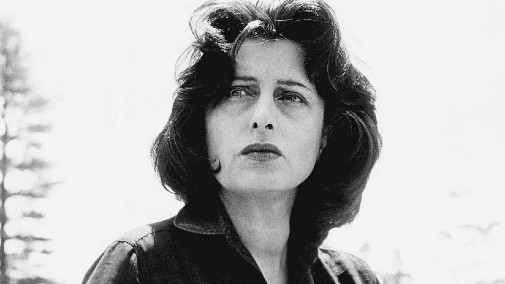
In 1957, the Italian actress Anna Magnani received her second and final Oscar nomination. She had won the Best Actress prize two years before thanks to her first Hollywood movie, the adaptation of Tennessee Williams' The Rose Tattoo, in which she gives a volcanic performance that's still considered, by many, as one of the best winners in the category's history. Still, despite such a glorious start, her career in American pictures was short-lived, encompassing only four films made between 1955 and 1969.
On one hand, Hollywood's mistreatment of a great actress is heartbreaking. On the other, Magnani's tenure in the American film industry feels right for her legacy, reflecting how one of a kind she was and how this acting titan resisted any and all attempts of assimilating her into the model of traditional stardom…
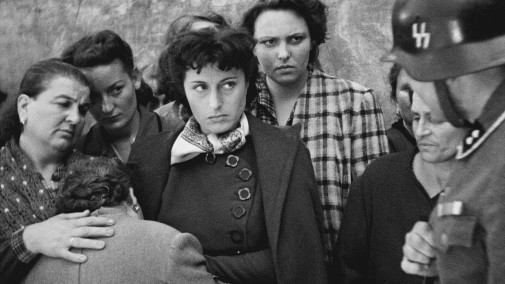
Anna Magnani's first credited film performance came in 1934 and for the first decade of her film career, the actress would earn the respect of the Italian public but little international recognition. Her acclaimed work on the stage also helped boost her reputation, though times were hard for her during the years of Mussolini's Fascist regime which the actress had no qualms about bad-mouthing. Her national fame and anti-fascistic conviction would play a part in securing the role that would change her life - Pina in Roberto Rossellini's Rome Open City.
She was one of the few professional actors in the picture's cast, but her acting style of extreme naturalism and improvisational business was at home in the neorealism the film would come to popularize and typify. As Pina, Magnani is an icon of perseverance whose final scene is among the great moments in cinema history. When, in 1946, Rome Open City premiered in New York, Locarno and Cannes before getting a worldwide release, Magnani became an international sensation. The actress even won the National Board of Review award for Best Actress while the film went on to score an Oscar nomination for Best Screenplay.
During the filming of Rome, Open City, Magnani fell in love with her director and, as the picture gained fame, so did their romance. The distribution of Italian films during the postwar years helped Anna Magnani be recognized, but it would be her involvement with Rossellini, who cheated on her with Ingrid Bergman, that truly made the Italian actress into a media darling. While it feels wrong to credit gossipy scandal for an actor's success, especially one as formidable as Magnani, it's important to understand how the love triangle of Magnani-Rossellini-Bergman helped the Italian actress acquire an American fandom.
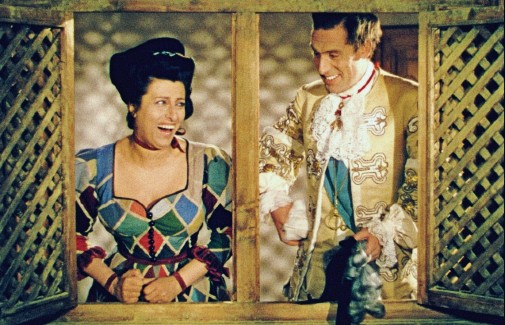
The sanctimonious public of the USA scorned the Swedish star and, at the same time, embraced Magnani as a wronged woman. Still, even as she became an unlikely household name, Magnani resisted the call of the American film industry. Reportedly, she felt insecure about her English-speaking skills and, while never confirmed, it's easy to assume she'd hesitate before trying to work in a culture that, even as it complimented her acting prowess, made constant unkind remarks about her appearance. That would change in the mid-50s, after a dedicated promotional tour for Luchino Visconti's Bellissima and a first attempt at Anglophone cinema with Jean Renoir's The Golden Coach.
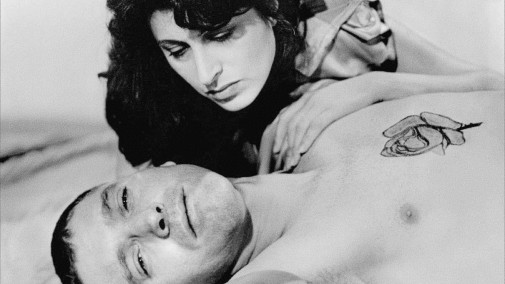
Tennessee Williams was one of Magnani's most devoted American admirers and he wrote The Rose Tattoo specifically for her. At the time of that play's stage production, Magnani declined the opportunity to play the Italian-American widow Serafina. However, when the text was adapted to the screen, the actress finally took on the part that had been created for her and was perfect in it. To watch Magnani tear through Williams' dialogues is a spectacle like few others. Even as she goes too big, there's something compelling about her, an ineffable magnetism.
Following such an amazing debut in American movies, Magnani would return to Hollywood for 1957's Wild is the Wind, directed by George Cukor and adapted both from Giovanni Verga's novel La Lupa. Considering the Italian press liked to call Magnani la Lupa (the she-wolf), it seems as if the role was as made for her as it had happened with Serafina. Still, while The Rose Tattoo tried to integrate Magnani's mercurial volatility into the language of American cinema, Wild is the Wind allows her to visibly bristle against such limitations. it almost feels like the raison d'être for the project is to make the unsure relationship between Magnani and Hollywood stardom into a sly metanarrative.
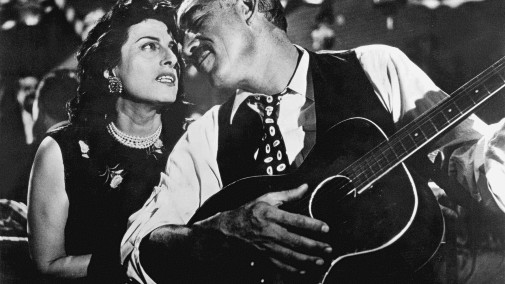
After all, Wild is the Wind is the story of Gioia, an Italian woman brought to Nevada as the wife of her dearly departed sister's American husband. Married to a man who wishes her to be a perfect demure copy of her dead sibling and confined by a culture incompatible with her fiery disposition, Gioia falls into spirals of self-destructive regret and agony, adultery and provocation. Playing a restrained, but no less bombastic, version of her usual screen persona, Magnani's naturalism is at odds with her surroundings, especially when it comes to Anthony Quinn's showboating performance as her spouse.
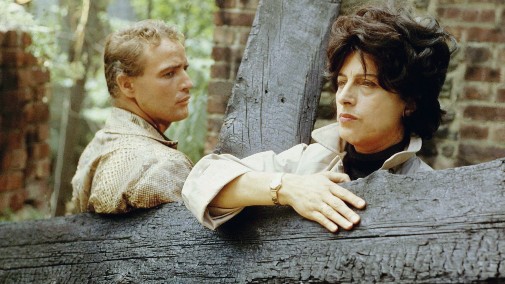
From her four Hollywood performances, Wild is the Wind is my favorite work of Anna Magnani for the way her acting style is made into the subject of the film rather than a mere part of its mechanism. That isn't to say she's bad in her other American movies. We've already talked about the wonder of The Rose Tattoo, but she's even more impressive in Sidney Lumet's The Fugitive Kind, another Tennessee Williams' adaptation that finds her sharing scenes with Marlon Brando. The younger actor was famously afraid of working with Magnani, reluctant to be overshadowed by her tempestuous talent. Still, the final result is a veritable acting masterclass.
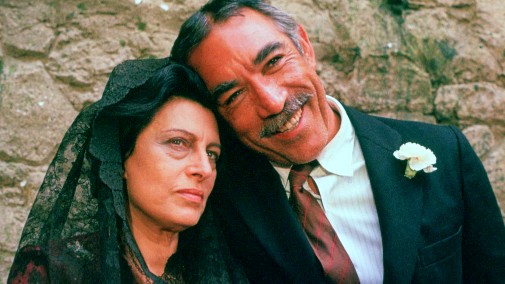
The same can't be said about her final Hollywood movie, a second collaboration with Anthony Quinn called The Secret of Santa Vittoria. The comedy about World War II and an Italian community intent on hiding their precious wine from the Nazis recalls a lot of Magnani's earlier Italian films, be it the 1930s comedies or the antifascist fervor of her late 40s work. However, while she's funny and well suited for the role of Quinn's long-suffering wife, the role is rather small, never allowing the actress to truly shine. She got a Golden Globe nomination for her troubles, but never again worked in a Hollywood production.
Four years after The Secret of Santa Vittoria, Anna Magnani died from pancreatic cancer in her beloved Rome, leaving behind a grand legacy of cinematic excellence that goes way beyond her quartet of Hollywood movies. Still, those movies are important in keeping the legend of Magnani alive and serve as a gateway to the marvel of her European work. If you loved her in The Rose Tattoo or Wild is the Wind, I recommend you search Rome, Open City, and its searing tragedy, the diptych of love gone mad that is Rossellini's L'amore, Bellissima's vision of maternal obsession and the grimy miracle of Pasolini's Mamma Roma.
If you love cinema and acting, Anna Magnani's worthy of your time and adoration.



Reader Comments (14)
Excellent text, as usual, Cláudio.
I rewatched The Rose Tattoo last week and it was a real pleasure to read this after being enchanted by Magnani once again.
Thanks for the writing.
Was pleasantly surprised by her work in Wild is the Wind. I'd never heard anything positive about that movie and had figured it was just her after-glow nom. But I think of that roster she might have gotten my vote. But her best work was definitely not in Hollywood.
Seem to be the only one who doesn't get Fugitive Kind AT ALL. Brando seems stoned, she seems annoyed, and Lumet films it all indifferently. It's so lethargic. Give the insane Redgrave film any day.
A great actress but too singular in an untraditional way to enjoy major Hollywood stardom. In that way she's similar to Shirley Booth, women capable of great scope in their acting but not able to be pigeonholed into the conventional leading lady roles.
Wild is the Wind lives up to its name, perhaps a bit too well but she's terrific in it. I loved her in The Rose Tattoo but I thought the overall film was hurt by Burt Lancaster's miscasting. I'm a big fan of Burt's but he was wrong for the part.
Love The Golden Coach, wish it was better known.
She was a re powerhouse.
Claudio you are a powerhouse.
Has anyone seen Marisa Tomei in the Broadway version?
Thanks for putting a spotlight on one of my favorite actresses. I would only push back a little against the idea that Magnani's success in the United States was due to her role as the scorned mistress of Roberto Rossellini. For one thing, Rossellini was married at the time he entered into his relationship with Anna Magnani (and had fathered two children). So, in that respect, Magnani didn't enter the relationship with Rossellini with clean hands either. Also, if the theory is correct that Magnani reaped a benefit from playing Jennifer Aniston to Ingrid Bergman's Angelina Jolie, then the proof would most likely lie in the box office receipts for the two films that both women worked on contemporaneously: Rossellini's Stromboli (which was to have starred Anna Magnani, before the director became infatuated with Bergman) and William Dieterle's Volcano (which followed a similar story line and was shot in similar locations). Stromboli did much better at the box office: people were intrigued by the whiff of scandal that was associated with the film. Public sympathy for the plight of La Magnani did not, in effect, translate into box office success for her film. And it's worth remembering, as well, that Magnani could hardly be cast as a paradigm of virtue, not only because she too was "guilty" of adultery, but she had also been the lead in "The Miracle" -- a Rossellini/Fellini collaboration that was marketed in the United States as part of an anthology film and was promptly denounced as sacrilegious and banned (paving the way for a court case that went all the way to the Supreme Court, resulting in a 1952 victory for the First Amendment and the film industry).
I would argue that Magnani's popularity in America was actually due to the strong impression that she made in Rome Open City and the critical acclaim that accompanied that legendary performance as well as her work in Visconti's Bellissima. After all, she had already been named Best Actress by the National Board of Review BEFORE Rossellini took up with Bergman. Simply put, Magnani was an actress who was strikingly original in the context of 1950s Hollywood and the press articles that came out in connection with her first trip to the United States all play up her cultural cache' (muse to great directors and playwrights) as well as her striking originality vis a vis the typical Hollywood actress of the time. Here's one description that clearly reads today as a coded reference to her non-WASP ethnicity: "the Magnani eyes reflected . . . the stark inscrutability of tenement windows." https://annamagnaniarchive.online/2016/05/28/magnanis-first-trip-to-new-york/ (I prefer that to another description from the same article, where the actress is described as a "searing symbol of gutter femininity." In that respect, I think Magnani's popularity and impact was possibly due to the increasing desire of women to see an idealized version of someone more like themselves, an ethnic beauty, up on the big screen (a precursor to the kind of impact and popularity Streisand ultimately achieved; and it is perhaps not too far-fetched to consider that Magnani may have been something of a role model for the actress-turned-singer). But, above all, it was her reputation as one of the greatest actresses of her time as well as her exoticism that assured the interest of the American public, not her reputation as a wronged woman. And, seriously, nobody could really wrong Anna Magnani. As far as the Magnani-Rossellini-Bergman triangle is concerned, La Lupa ultimately got the last laugh: Rossellini cheated on Bergman and they separated in 1957; Magnani and Rossellini mended their relationship during the last part of the actress's life and she was buried in Rossellini's mausoleum until the late 1980s when her son had her remains moved to a small cemetery near the family villa.
Surely her greatest performance is in Visconti's "Bellissima," as one of the greatest screen mothers in cinema. Of course the same could be said of "Mamma Roma." Those are two all-time performances.
Rome, Open City and Mamma Roma. Now those are films to watch.
Peter -- She gets my vote in 1957 out of the Oscar lineup, to be perfectly honest.
joel6 -- The Golden Coach is a masterpiece and one of the best films ever made about theatre.
Davide -- I don't think nor do I state that all of her American success was due to the love triangle with Bergman and Rossellini. However, I do believe it played a part in her popularity with the American public, which opened doors to Hollywood. Reading up on many gossipy pieces about Bergman, where the Swedish actress is constantly lambasted, Magnani is often mentioned in a positive light. Since Open City was released in 1946, Magnani was always recognized as a great actress by the American media, but the coverage of the scandal made her be talked about as other stars of the period. This is mildly hilarious since, as you mentioned, she wasn't married to Rossellini and was guilty of adultery herself.
Whatever the case may be, I didn't want to dedicate too much text to that part of her Hollywood legacy because it has nothing to do with her acting, so I'm thankful for your comment, which explores the matter in much more detail. I apologize if my wording in the piece sounded glib or unfair towards the artists involved.
Jonathan -- The Golden Coach is my favorite film featuring Anna Magnani, but my favorite performance of hers is Bellissima. That latter flick was eligible for the Oscar in 1953 and she'd get my vote in the Best Actress category.
http://www.francodalessandro.com/tennmuse.html
The world hungered for the profound authenticity of Magnani. She was the antidote to Hollywood's glamorous pretense. Williams got that. This is the subject of my internationally acclaimed play and soon-to-be film on Anna and Tennessee, entitled Roman Nights.
Further information, as presented by Smackdown panelist Izzy/Be Kind Rewind re: Magnani - https://www.youtube.com/watch?v=L3DdzN6Ji7M
madeofstars: That's a great video essay, which anyone interested in Magnani should watch. Of course, all of Be Kind Rewind's videos are amazing.
I've seen all of her English films but hardly any of her Italian films. This post and the responses have given me some titles to look for! Thank you!
I like her work in Wild Is The Wind the most. She was easily the best part of the film and my vote for Best Actress 1957.
The Rose Tattoo is more problematic for me. Burt Lancaster's very broad performance nearly ruins the film for me. She's "big" but he's ridiculous. Susan Hayward would be my winner for 1955 (I'll Cry Tomorrow).